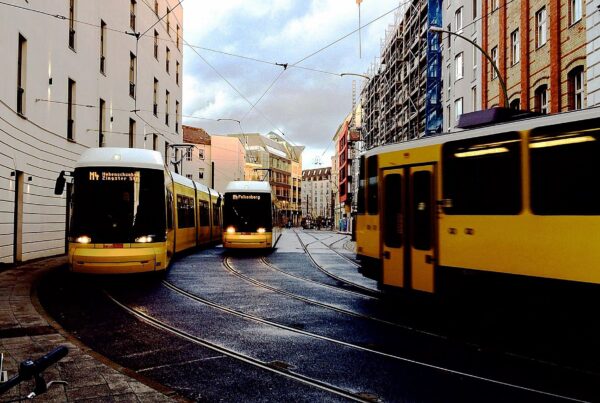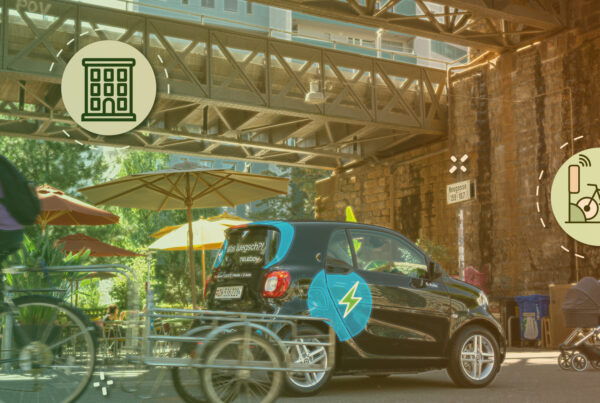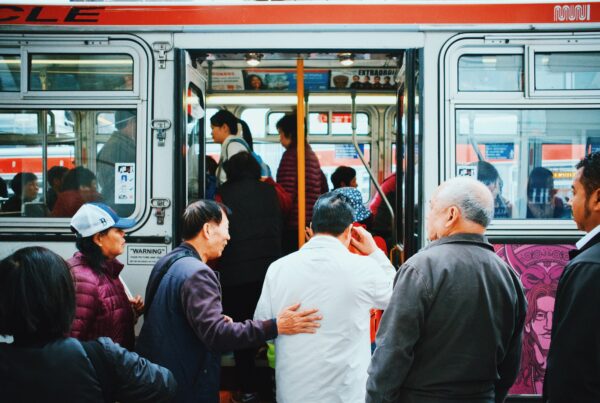The Mobility Hub
Your weekly guide to the latest in shared mobility
SUMC News and Announcements
You might remember Tiffany Chu as the very first speaker and host for our 2021 National Shared Mobility Summit, where she led a discussion on data systems and power structures. She was also a plenary speaker at our 2019 Summit.
Today we’re excited to announce that she is bringing her expertise in design and technology and passion for designing better cities for people and the planet to the SUMC Board.
Tiffany is the SVP of Remix—which Via acquired in March—a collaborative mobility platform that works with 350+ cities worldwide. She also launched the UX practice at Zipcar, was commissioner of San Francisco’s Department of the Environment, and has worked with Code for America, MIT Media Lab, Continuum, and more. You can read more about her here.
We recommend watching Tiffany’s Key Conversation at the 2021 National Shared Mobility Summit too: How can data about our cities challenge existing (societal) power structures?
Five new brief overviews on projects and partnerships all over the map.
It’s all on the SUMC Learning Center
Take a moment to read about DC Metro’s new electronic fare card and partnership with Capital Bikeshare, new micromobility projects in Toledo and Boulder, bicycle donations to BIPOC youth from Superpedestrian, and e-cargo bikes in Milton Keynes, England.
We recently signed a letter to two Senators we’re excited to tell you about.
The letter, sent to The Honorable Sherrod Brown, Chairman U.S. Senate Committee on Banking, Housing and Urban Affairs, and The Honorable Patrick J. Toomey, Ranking Member U.S. Senate Committee on Banking, Housing and Urban Affairs, asked the senators to include $10 billion in funding for the Community Revitalization Fund as part of the current reconciliation bill.
We firmly believe that “civic infrastructure must work hand in hand with investments in housing and transportation to address historic inequities and create economic and social resilience.” Congress, let’s get it done! Read the letter
Mark your calendars! The Chicago Metropolitan Agency for Planning is hosting its first State of the Region event on October 7. It’s free, virtual, and open to everyone. Learn more and register.

Mobility Justice
As the Detroit Department of Transportation announces service cuts for the already struggling bus system, frequent DDOT rider and transit advocate Medvis Jackson calls on the city to invest in a more robust, equitable system that offers tangible opportunity to residents and boosts economic development citywide.
At what cost is electricity? Urban Institute points out that Black, Indigenous, and Latinx communities suffer the most from increased pollution from fossil fuel-produced electricity. Our grid and power MUST be renewable to combat environmental injustices from electrification.
Climate action sees results! According to a recent report by Indigenous Environmental Network, Indigenous-led resistance and climate justice efforts against 21 fossil fuel projects across the US and Canada has led to a saving of 1.587 billion metric tons of annual emissions—roughly 400 coal-fire plants or 345 million vehicles.

Ridehailing/Carsharing/Carpooling
Transportation barriers in Chicago’s West (and South) sides have stark outcomes for community health, namely a life expectancy 16 years less than affluent neighbors. While equitable transportation is the answer, new door-to-door flexible route service offered by Sinai Chicago Hospital will help make up the gap.
Flower City Car Share, aka Floshare, launches in Rochester, NY with four electric vehicles at the Rochester Public Market and St. Mary’s Hospital to give residents more options for affordable and sustainable shared mobility.
Central Iowa is on-demand thanks to the Des Moines Area Regional Transit Authority. For starters, the agency announced plans for an ADA-accessible microtransit pilot in Ankeny, IA to start this fall—with West Des Moines on the horizon after.

Bikesharing & Micromobility
The Brooklyn bridge protected bike lane is open! So what’s the verdict? Curbed believes it meets a basic standard for biking infrastructure but falls short on a couple fronts (e.g., a bit narrow at only 8 feet wide with little room for cargo bike traffic and a confusing Manhattan-side connection).
VIDEO: Over in Barcelona, they have a wealth of protected bike lane infrastructure and they use tactical urbanism to reclaim street space from cars. Biking Barcelona dives into some city planning history and cycling upgrades in their latest video.
Micromobility service providers in the Twin Cities have been a separated affair, but now the cities of Minneapolis and St. Paul, along with the Minneapolis Park and Recreation Board and University of Minnesota, are combining efforts to choose a single provider for the metros, meaning consumers can bike or scoot between the two cities.
Swiftmile this week teamed with Europe’s largest parking operator, APCOA, to install e-bike and e-scooter charging stations in parking garages across Stuttgart, Germany. Micromobility giant TIER will be the first to put the stations to use, to charge its local e-scooter fleet.

Transit
In the US, public opinion around public transportation seems to circle around (often unfounded) messages of danger and a widespread view that cars are the preferred way to get around. While transit needs better service and access, it isn’t the doom and gloom experience people have been led to believe.
Electrification is at the top of Pace’s mind by committing to all zero-emission buses and other vehicles by 2040 thanks to efforts championed Sierra Club Illinois, Clean Power Lake County, and the Climate Reality Project.
New York and New Jersey are butting heads over the split of federal relief funds—to the tune of $14.2 billion—to aid mass transit, with NJ Transit pushing for a larger share but New York’s MTA countering that its higher ridership numbers require otherwise.

Technology
Self-driving tech startup Aurora has officially unveiled its latest autonomous Toyota Sienna designed for its planned Uber ridehailing service in 2024 in pilot that covers Pittsburgh, Dallas, San Francisco’s Bay Area and “yet-to-be-disclosed cities.”
Ann Arbor, MI is jumping deeper into the driverless trend with the launch of the new A2GO autonomous shuttle service—in partnership with May Mobility, Mcity and Ann Arbor SPARK—that’ll cover a 2.6 square-mile area around downtown and feature four hybrid-electric Lexus RXs and an all-EV Polaris GEM.
DC’s Metro will turn a 115-year-old streetcar storage building (with preservation in mind) into an all-electric bus garage by 2025 in hopes that the facility is ready to go for a full zero-emissions vehicle fleet by 2045.

Sustainability
During a recent panel featuring The Greenlining Institute, the City of San Diego, and Nissan, speakers highlighted the urgency of sustainable infrastructure aligned with local and federal policy that gets people out of personal cars while making sure marginalized communities, who’ve bore the brunt of health-deteriorating pollution, aren’t left behind.
Countries will need to collectively cut global carbon emissions 45% by 2030 to mitigate the disastrous effects of climate change, but a new analysis shows emissions might rise 16% in that time—leading to a temperate rise of 2.7C (4.9F). Our climate plans must be updated to reflect a greater urgency to take transformative action to keep things from getting worse.
Now for positive action! Climate coalition ‘America is All In” has released a blueprint for governments, business, and civic organizations including strategies for lowering emissions through policy, design, and investment in clean energy sources, transportation, and more.
Speaking up for change can create change. Case in point, biking and walking advocates did just that at a recent meeting with the Durham Chapel Hill Carrboro Metropolitan Planning Organization. Now the organization is working on an updated transportation plan for the next 30 years. Attend meetings and stand up for clean, shared mobility.
Project Funding Opportunities
2-Year Position: Active Transportation Specialist
Hawai’i State Energy Office
Honolulu, Hawaii
Deadline: September 30
RFP: Community Mobility Read-to-Launch Grants
National Center for Mobility Management
Deadline: October 15
Invitation for Bid: Purple Line Bus Rapid Transit Construction Project
Indianapolis Public Transportation Corporation (IndyGo)
Deadline: October 28
Email Dave Adamson at [email protected]
RFP: Micro Transit Program
Greater Cleveland Regional Transit Authority
Cleveland, OH
Responses Due: October 29





